
Hello Total War community!
We're excited to present the fourth and final instalment of the Total War: PHARAOH development update series. This week, we'll be focusing on the new features and enhancements awaiting you in Campaign, the heart of the gameplay experience. From here, you'll orchestrate magnificent war campaigns, construct your economy from scratch, and scheme against your eternal enemies in the court.
Before diving into the details, just a reminder that in the previous blog we unveiled the new and revamped battle features included in the DYNASTIES update.
⚔️ TOTAL WAR: PHARAOH - DEV UPDATE - BATTLE
Let’s dive straight into the specifics of the Campaign!
To accommodate the new cultures in the upcoming update, we've added new content, offering an immersive experience for players conquering the ancient world with these factions. The systems below work differently for each culture, reflecting the specifics of their lifestyle, religion, customs, and traditions. Here is how:
DEITIES:
In Ancient Egypt, gods were thought to preside over many aspects of life and their presence was central to the everyday lives of citizens, soldiers and rulers. Embracing this rich tradition, we've ensured that the gods play a pivotal role in both the Aegean and Mesopotamian factions, enhancing the depth and authenticity of players’ experience.
In the Aegean, we have five iconic Greek gods: Zeus, Poseidon, Apollo, Ares, and Aphrodite.
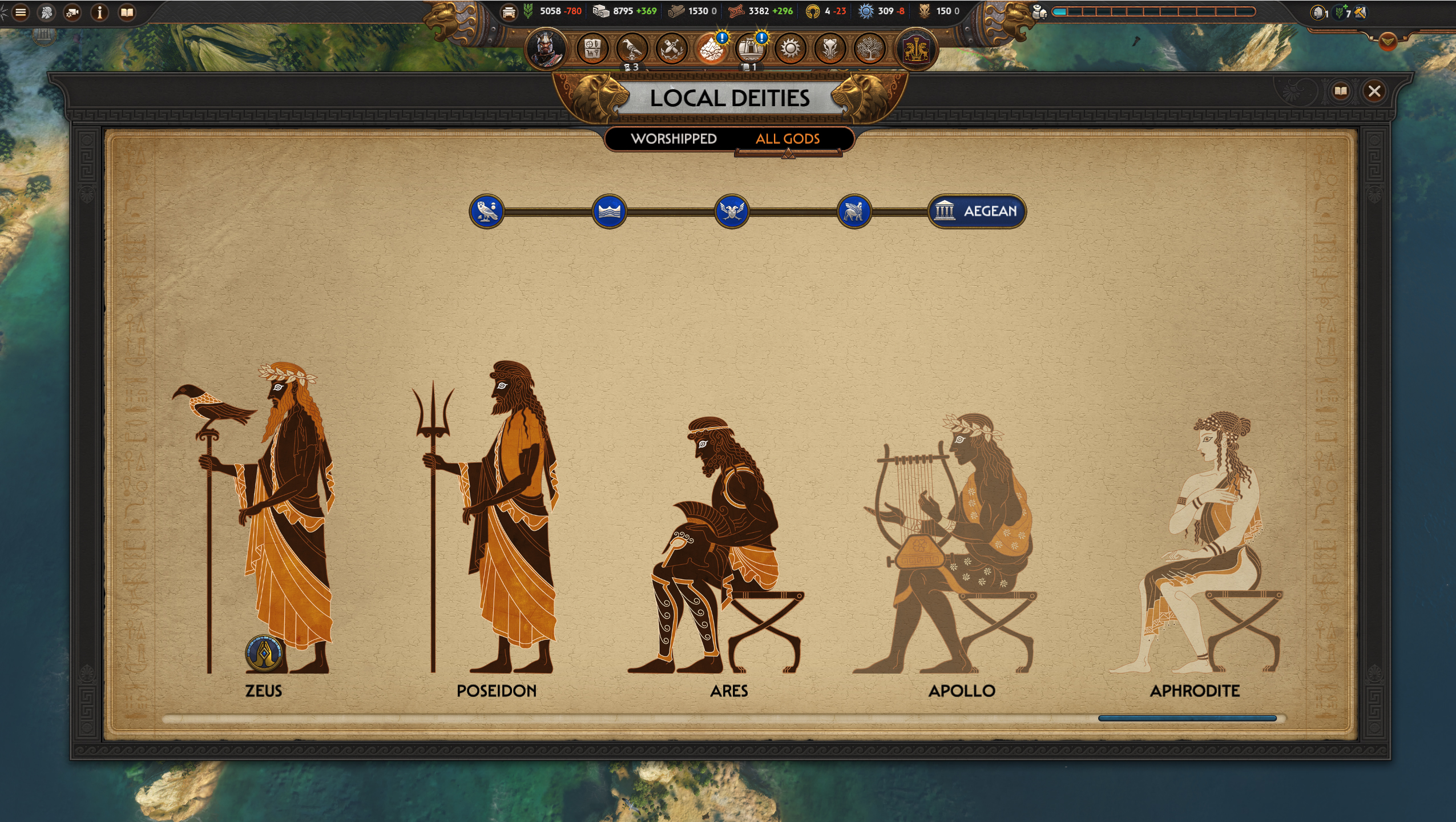
AEGEAN DEITIES
We're introducing the Hecatomb, a feature that lets players advance their chosen deity by offering food, enhancing their divine blessings. Performing a Hecatomb bestows specific prayer effects on all your armies—for example, a Prayer to Poseidon grants immunity to sea attrition and increased movement at sea, while a Prayer to Zeus boosts morale and reduces fatigue. The Hecatomb has a cooldown period and can be upgraded by a Royal Decree.
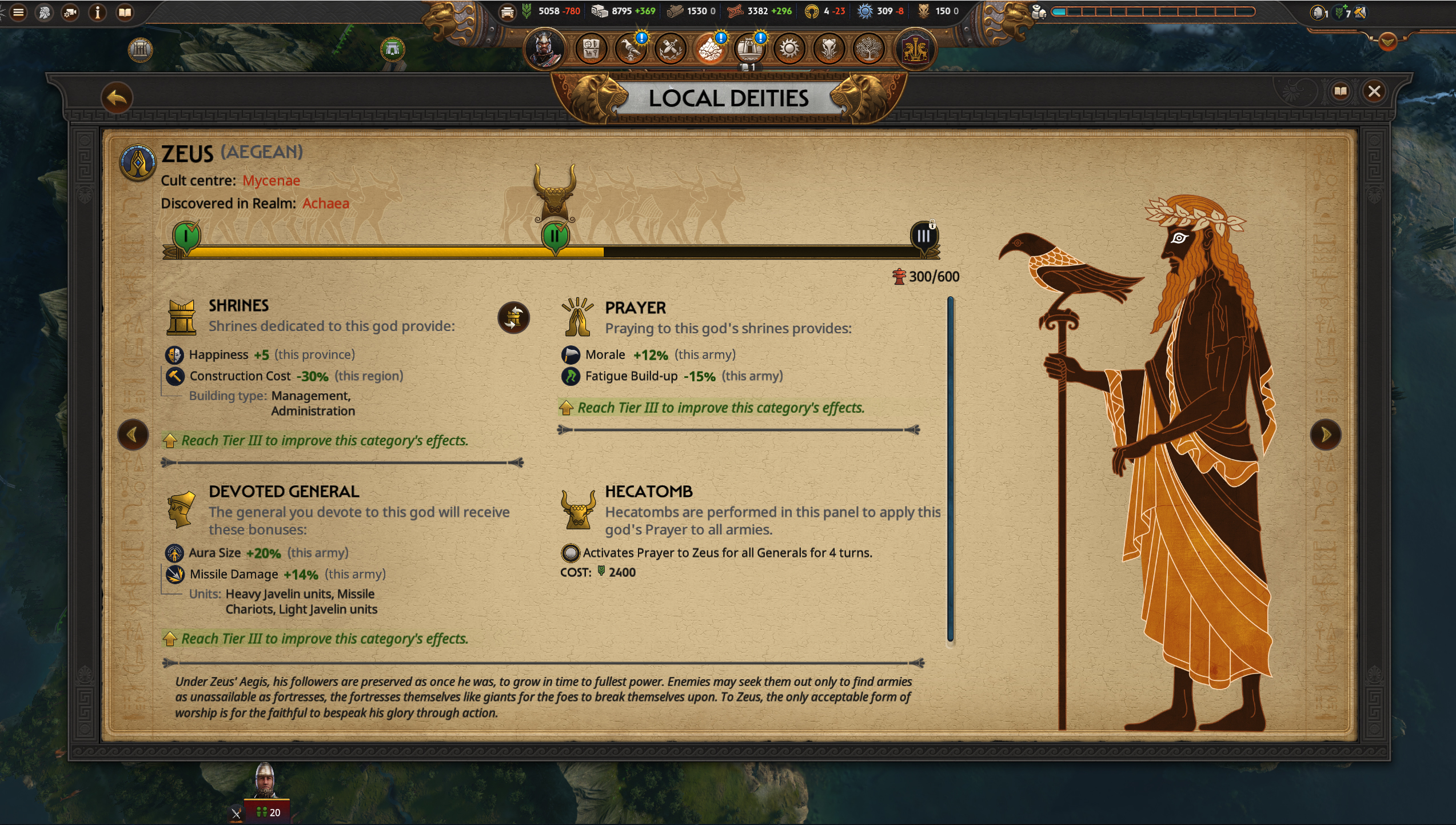
HECATOMB
The gods in Mesopotamia are Ashur, Ishtar, Inshushinak, Marduk, and Ninurta.
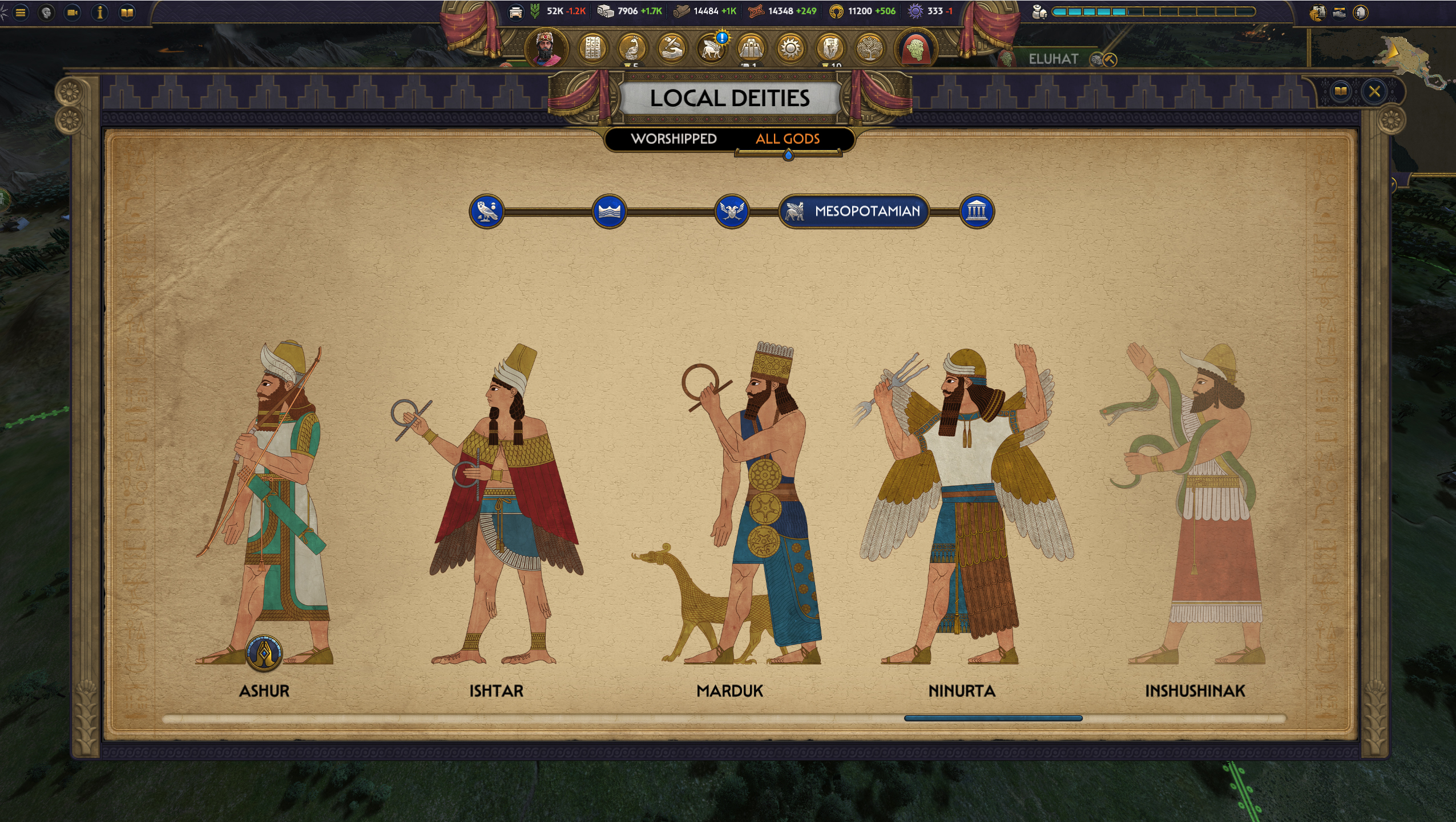
MESOPOTAMIAN DEITIES
The new feature we are introducing with them is called Dwellings – a religious Tier 1 building, which is unlocked once you worship a Mesopotamian god. It can be built in both minor and major settlements and it provides god-specific effects and grants favor, allowing you to maximize the favor tier to a god with fewer territories.
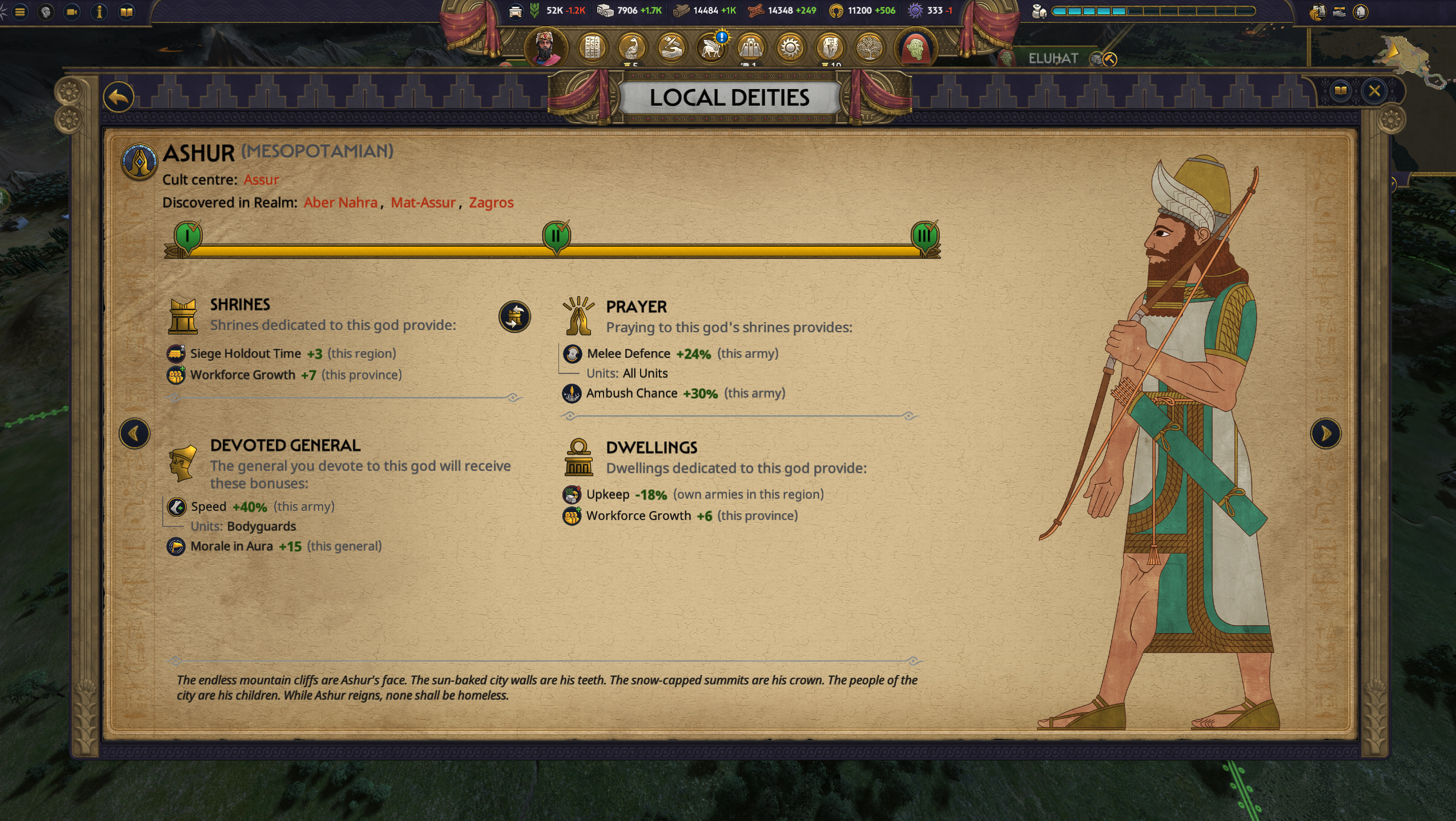
DWELLINGS
LEGITIMACY:
The Aegean has its own distinct royal tradition, characterized by a new Legitimacy factor known as Heroes – these are high-rank generals that grant Legitimacy. The king, referred to as Wanax, is adorned with regalia in the form of shields. The royal court features two commanders, or Heqetas, one of which providing Anatolian units and the other - Greek units. We have also introduced two new royal powers: Remote Colonization, which allows the Wanax to take control of abandoned settlements from afar, and War Games, a feature that enables the rapid levelling up of units with a simple click of a button.
For Mesopotamia we are introducing a new Legitimacy factor called Religion, where reaching higher favour thresholds with certain gods grants Legitimacy points. The king, titled the ‘King of the Universe’, is adorned with regalia that includes a mace, an axe, a chariot, and a large ring. The court is uniquely composed of multiple kings, for example, King of Babylon is a position in the court. Each king must control their designated city and has access to their units through Special Recruitment. Additionally, we are introducing two new royal powers: Agitate, which allows the king to provoke rebellion in adjacent territories, and Bribe, which enables the prevention of enemy attacks through financial incentives.
ANCIENT LEGACIES:
As you might be aware, the Ancient Legacy mechanic offers a variety of iconic historical leaders for you to emulate and playstyles to explore. With this update, we are introducing four new Ancient Legacy systems for you to choose from: two Aegean and two Mesopotamian.
The first Aegean Ancient Legacy mechanic is named after Atreus, who is believed to be the slightly mythological father of Agamemnon and Menelaus. Essentially, it rewards the player for playing aggressively and allows them to crush weaker factions without going through the motions of conquering each and every settlement through the intricacies of diplomacy. The flow is as follows: Declare War, then complete objectives against enemy factions, such as Defeat Faction Leader, Conquer Capital, Raid Resources, Sack/Raze target region, Defeat specific Hero, etc. This allows you to accumulate Dominance which you can spend on Diplomacy, Court Actions, Royal Powers and some limited-time Legitimacy.
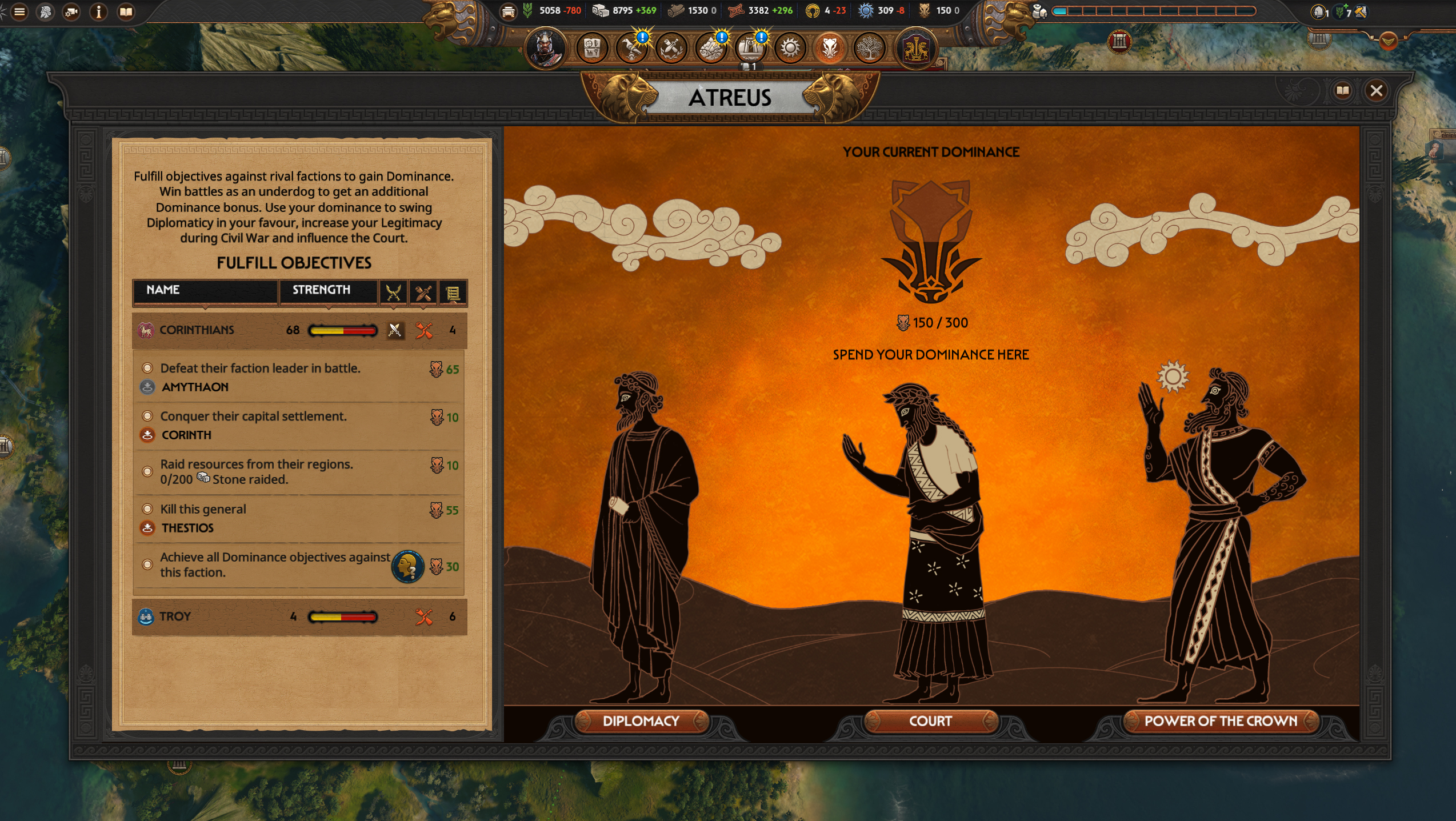
ATREUS ANCIENT LEGACY
The second Aegean Ancient Legacy mechanic is named after Perseus, the mythical founder of Mycenae who created an empire through network alliances. In a nutshell, with this Legacy the player can use Global Recruitment to hire faction units from allied rosters. The more regions allies control, the more they can utilize Global Recruitment. This mechanic allows the player to create the most diverse roster by forming alliances instead of conquering, representing a ruler who focuses on diplomacy in a positive way and benefits from it without betraying their allies.
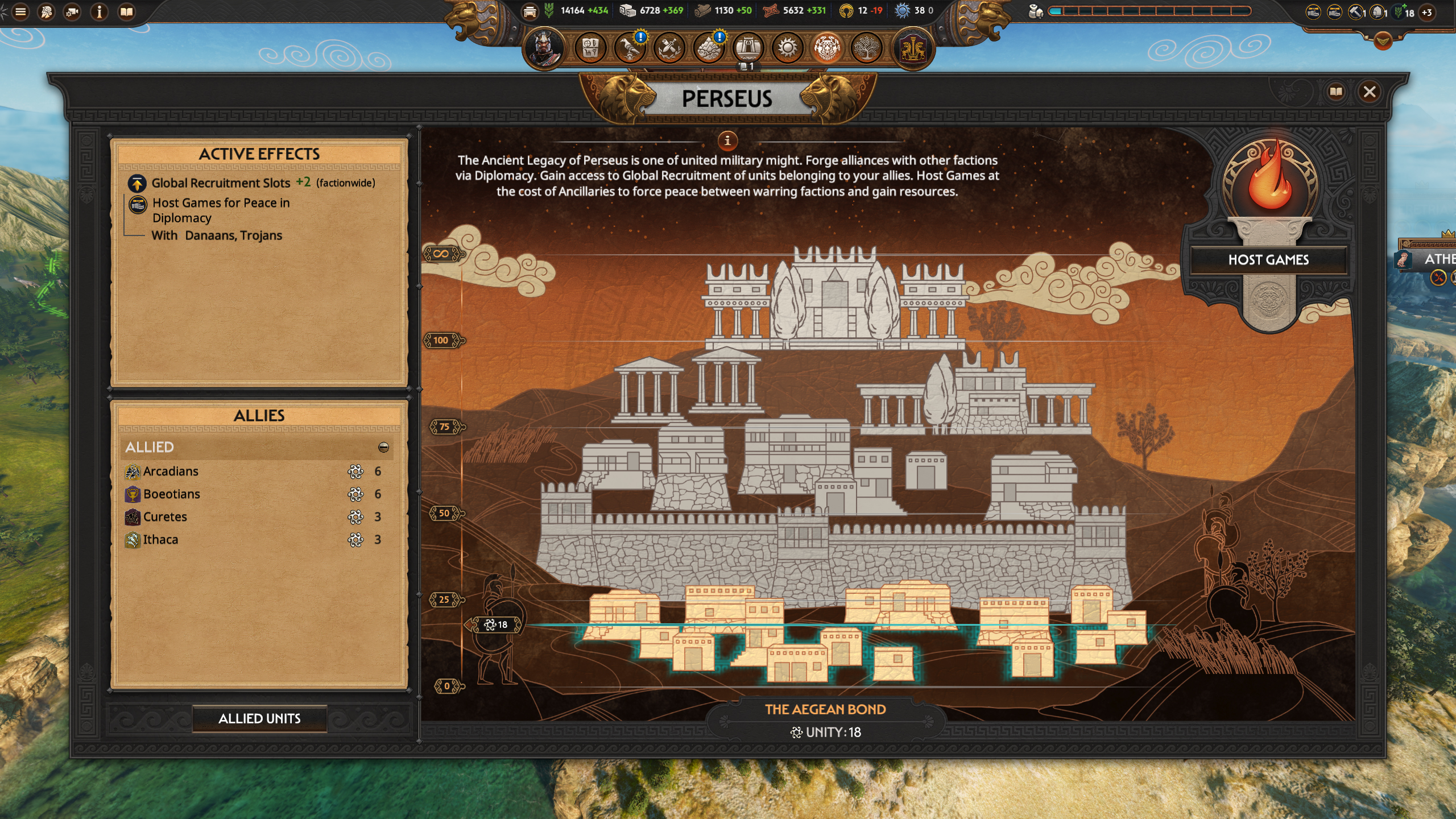
PERSEUS ANCIENT LEGACY
Moving on to the Mesopotamian Ancient Legacy mechanics, we have Sargon of Akkad, the great first ruler of the entire Empire of Mesopotamia. Adopting the Legacy of Sargon allows you to select up to two regular ambitions to unlock unique abilities in one of the following categories: Builder, Conqueror, Diplomat, Raider, Overseer, Strategist, and Warrior. Additionally, you can choose one grand ambition, a more challenging objective that provides greater rewards, such as Victory Points.
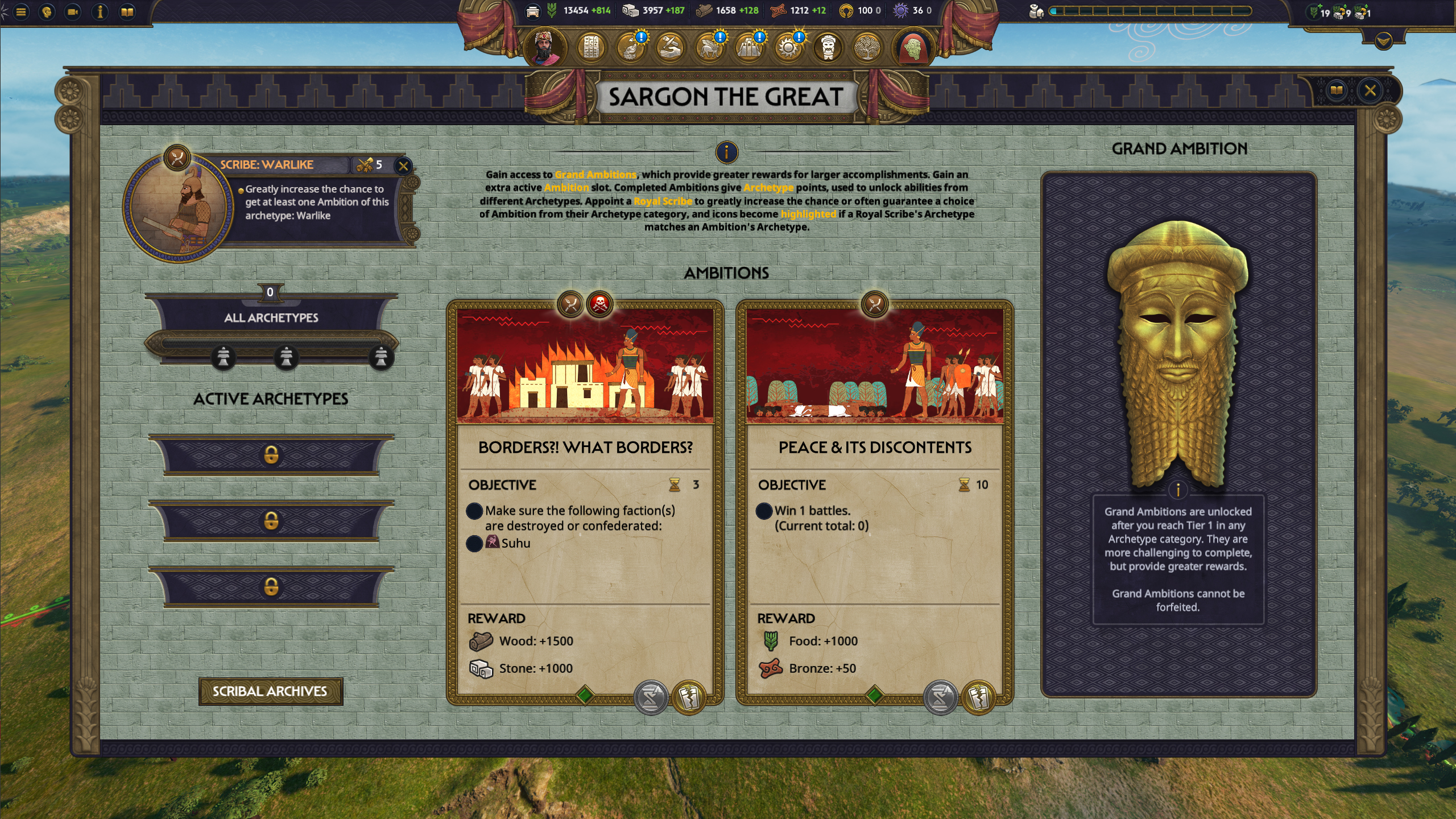
SARGON THE GREAT ANCIENT LEGACY
Hammurabi is the second Ancient Legacy mechanic for Mesopotamia. Known as the king of the Old Babylonian Empire and famous for creating a code of laws, Hammurabi's Ancient Legacy in the update allows players to create their own Laws, a variation of the Royal Decrees. Each Law contains a number of passive effects and requires a certain number of turns to be researched. Once the Law is researched, its effects are permanently applied to the player's campaign.
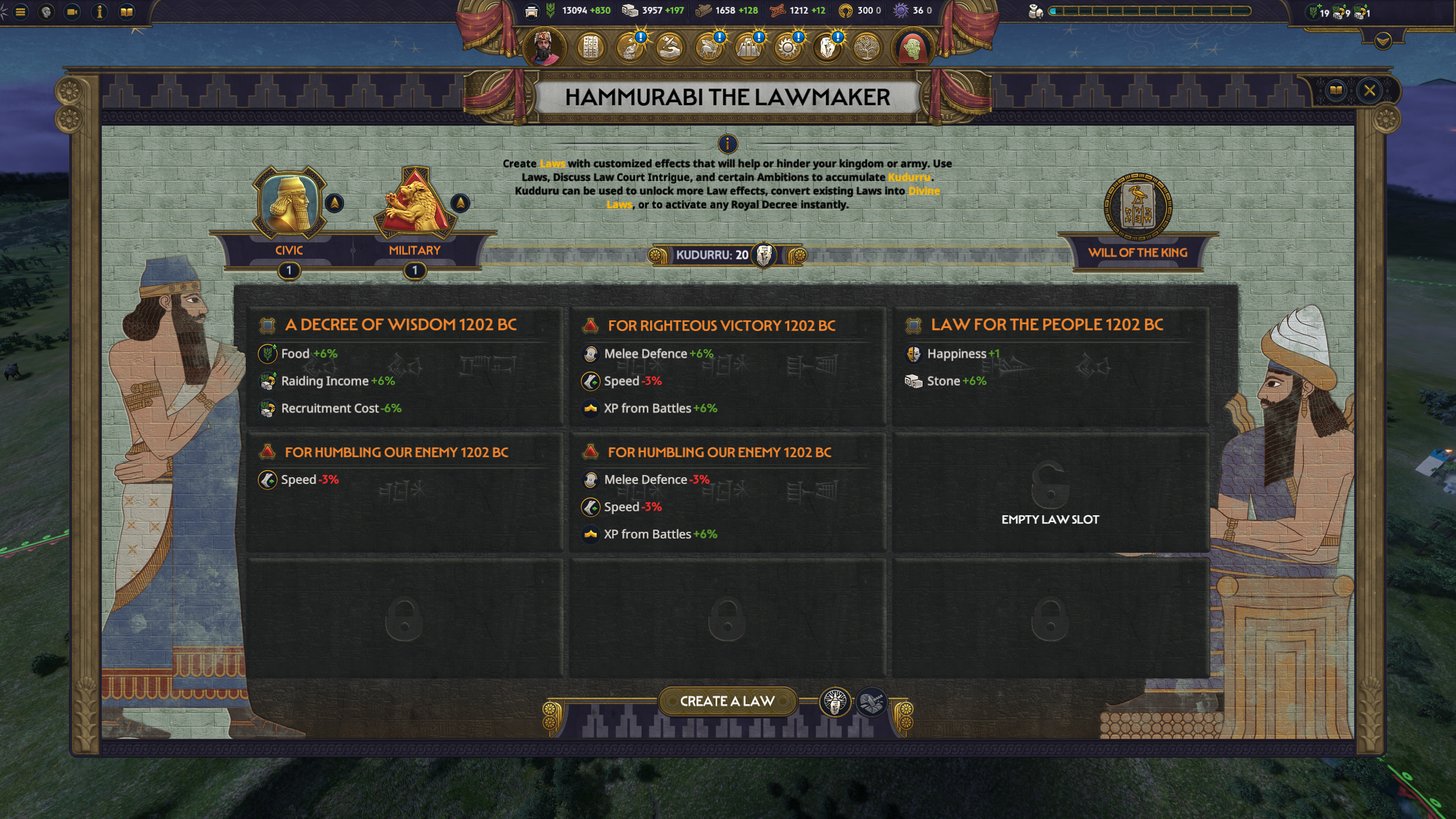
HAMMURABI ANCIENT LEGACY
This is far from everything that we've included in the Dynasty update - we are also introducing a few new systems that are shared among the different cultures. Let’s have a look:
DYNASTY SYSTEM:
To better depict the historical realities of factions, their leaders, and the larger dynasties they belong to, we are introducing a new feature in the game called 'Dynasty’. This system introduces a family tree, providing a more in-depth role-playing system which allows you to reign over the tides of mortality and succession, navigate strategic marriages, heroic deaths on the battlefield, assassinations and the looming threat of old age to leave behind a legacy that will last the ages. Let's explore what they are and how they work:
Mortality
Characters are now mortal and can be killed in battle, in auto resolve, during assassination plots, and due to old age. Aging will also be visible, with older models of the main characters displaying wrinkles, grey hair, and other signs of getting older. For those who prefer to continue playing with immortal Faction Leaders, this option can be turned on or off via the customization panel.
Turns per year
Another system we've implemented to enhance the realism and immersion of the Dynasty system is the Turns Per Year modifier, accessible in the customization panel. This feature allows players to adjust the duration of a year in terms of game turns—offering options such as 1, 3, 6, or 12 turns per year. This flexibility enhances the dynamic nature of gameplay within the Dynasty system.
By modifying the turns per year, players can tailor the pace of historical progression and strategic planning to their preferences. For instance, opting for fewer turns per year can simulate longer periods of historical time within a shorter game duration, while more turns per year can accelerate the pace of events, leader inheritance and dynasty development.
This feature not only provides strategic depth but also enriches the overall gameplay experience by allowing players to engage with historical and dynastic elements in a manner that suits their play style.
Ruling family
The Ruling Family represents the family tree of the faction, where players can appoint Scion characters to inherit the faction after the current leader dies. Characters can also marry each other, marry randomly generated characters, or choose spouses from other factions in Diplomacy.
The Dynasty System tracks all characters related by blood to their Faction Leader. This is relevant in several ways, including ensuring a smooth inheritance of the faction, founding a new Dynasty in the royal tradition upon succession, and receiving more experience on the campaign to differentiate from generals of less prestigious lineage within the faction.
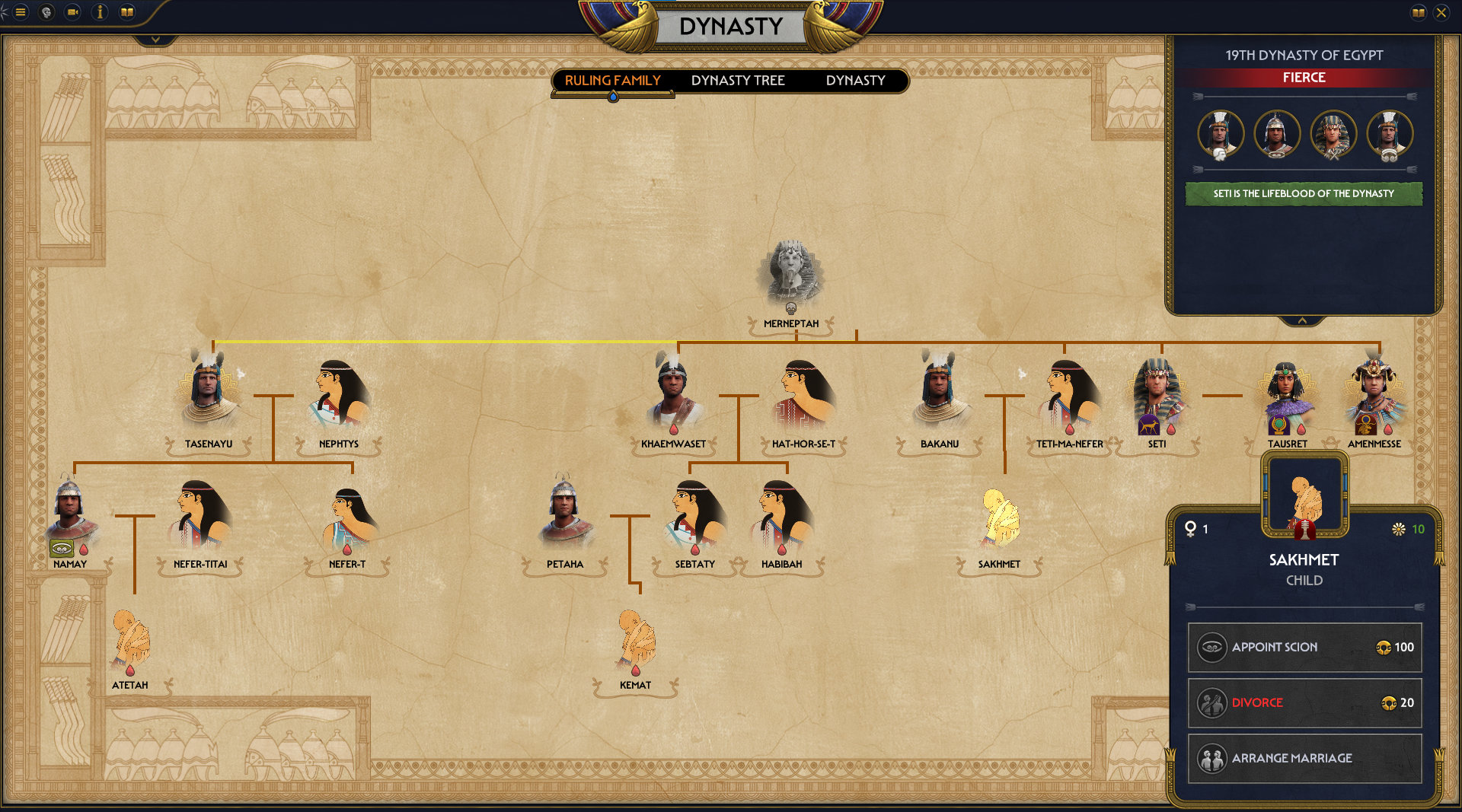
RULING FAMILY SCREEN
Dynasty tree
The Dynasty Tree is a streamlined representation of the Supreme Leader’s inner circle, consisting of Adopted Leaders and immediate family members. Players who enter a Dynasty through Adoption and accumulate enough Legitimacy can be appointed as Heirs, potentially becoming Pharaohs through a peaceful process. Conversely, those who achieve Pharaoh status through Legitimacy wars will establish a new Dynasty in their Royal Tradition over which to rule. There are four Dynasties existing at any one time corresponding to the four Royal Traditions - Egyptian, Hittite, Mesopotamian and Aegean.
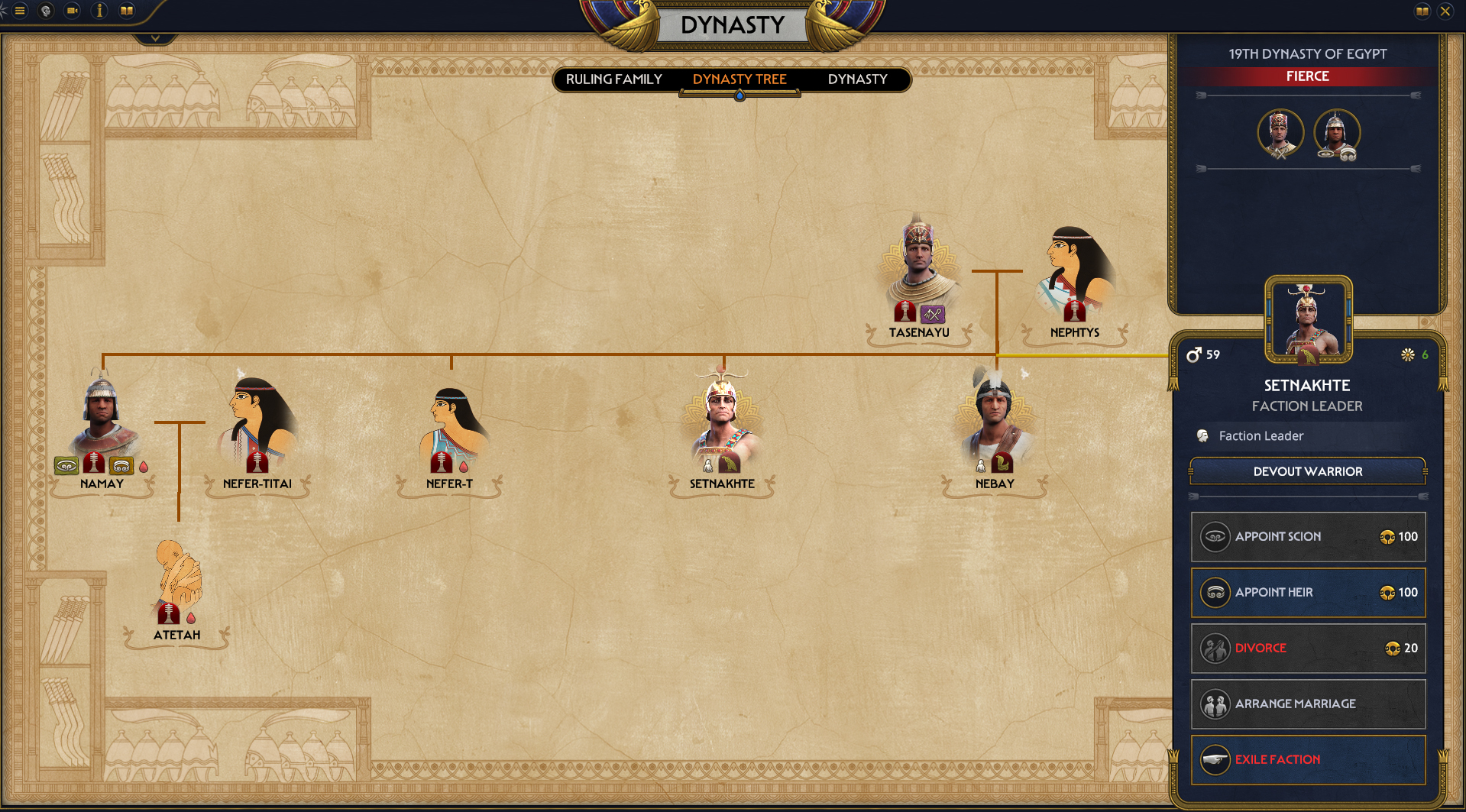
DYNASTY TREE SCREEN
The Dynasty System also tracks the exploits of each Supreme Ruler in the form of Deeds. These Deeds are recorded and can eventually illustrate the ruling aspect of the current dynasty, granting various tiers of effects. Additionally, each Deed provides an Epithet that can be equipped on the Supreme Leader for added flavor.
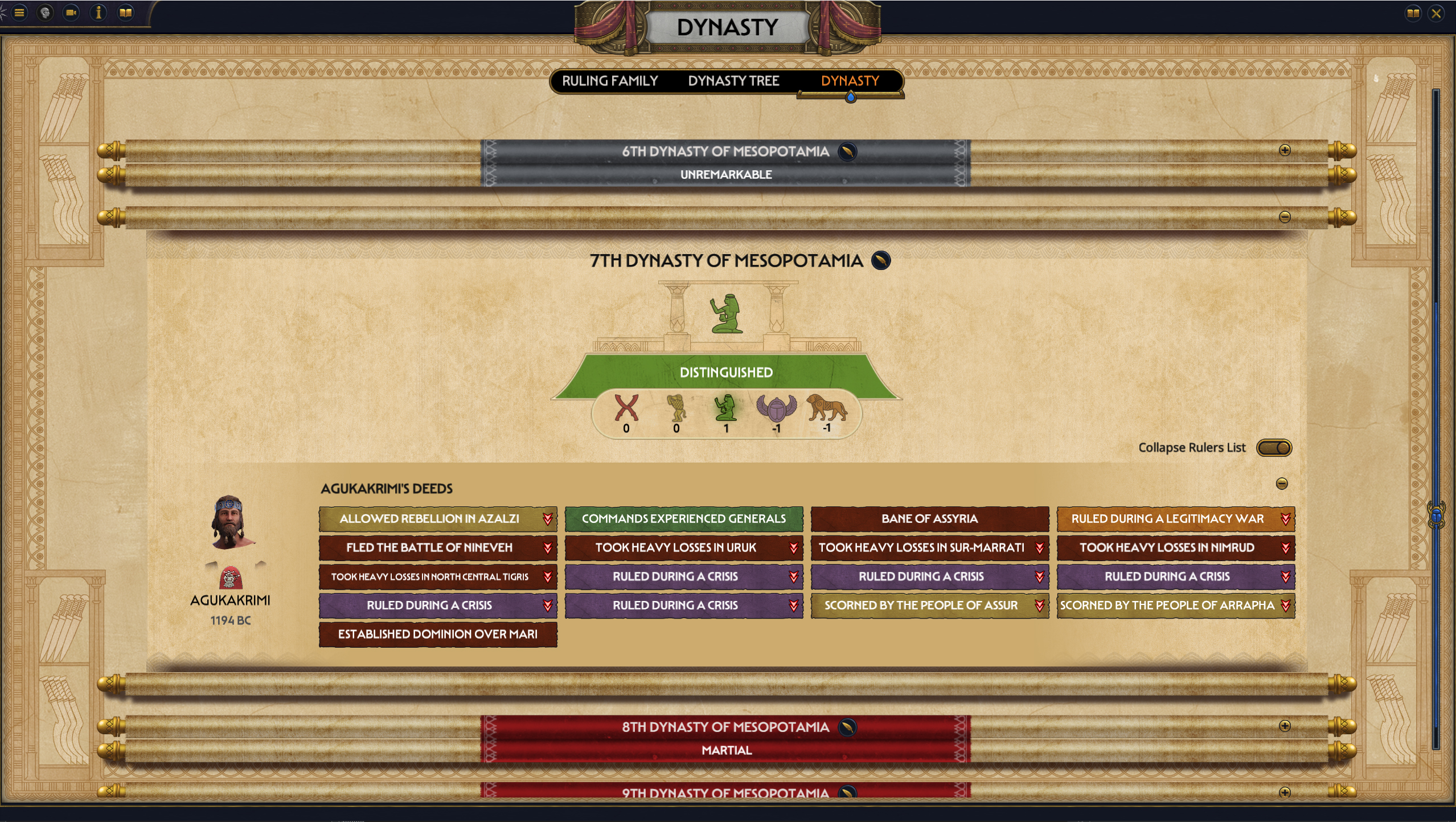
DEEDS SCREEN
The Dynasty System, along with its subsystems, is a shared mechanic among all cultures in the game and is consistent for all of them.
DIPLOMACY:
With the Dynasty update, we are introducing four new Diplomatic Actions. While these Diplomatic Actions are not essential for the functionality of the overall Dynasty System, they offer additional strategic and immersive depth.
Adoption into the Dynasty allows players to engage as a Supporting Faction within the Dynasty without becoming the Supreme Leader themselves. Additionally, it enables the expansion of the Dynasty with other factions once the player ascends to the role of Supreme Ruler.
Diplomatic and Political Marriages: All factions have access to Diplomatic Marriages, allowing you to give or request characters as spouses for your faction. Being part of a Dynasty, however, grants access to Political Marriages, enabling both characters to remain in their respective factions, similar to Tausret and Seti. Strategically using these options and finding the best matches for your characters can provide a significant edge in Diplomacy while keeping your family populous.
Legitimacy Support integrates Legitimacy into the economic and diplomatic systems, enabling players to gain resources or enhance diplomatic relations by bartering their Battle Legitimacy. It also offers a way for players to act as Kingmakers, enhancing the immersive experience.
Forced Inheritance provides a method for players to extend their family into other factions for strategic or immersive purposes. This action also justifies the presence of relatives in different factions, which is common among Egyptian and Hittite faction leaders.
OTHER SHARED MECHANICS UPDATES:
With this update, we are adding more content and making several enhancements and modifications to most of the existing shared mechanics. These include Ambitions, Character Titles, Ancillaries, Hatshepsut the Merchant, Thutmose the Conqueror, Victory Objectives, and others. To support these additions, we are also introducing new bespoke landmark buildings.
Additionally, we have overhauled the behaviour of the Sea Peoples. Sea Peoples invasions are now controlled by the campaign AI, which means they will make more strategic decisions and behave like real factions instead of scripted armies. They will even conquer territories and expand.
We have also added new Campaign Customization options, including the ability to select any Ancient Legacy, choose any Royal Power, shuffle commands, and edit the base chance of Lethality. Additionally, players can now customize general XP gain, character mortality, seasons, and turns per year as already mentioned above.
JOIN THE DISCUSSION ON DISCORD:
That wraps up the Campaign Dev Update for Total War: PHARAOH and concludes this blog series. We hope we've covered all the details you were curious about. However, if you still have any questions about any aspect of the DYNASTIES gameplay update (campaign, battle, units, etc.), we encourage you to post them in the dedicated Q&A forum on our official Discord server. On July 18th, we will host a live event with the PHARAOH dev team, where we will try to answer as many of your questions as possible.
Thank you once again for your continuous support and invaluable feedback. Keep an eye on our official channels for more information about this update. See you on the battlefield!
– The Total War: PHARAOH team
















